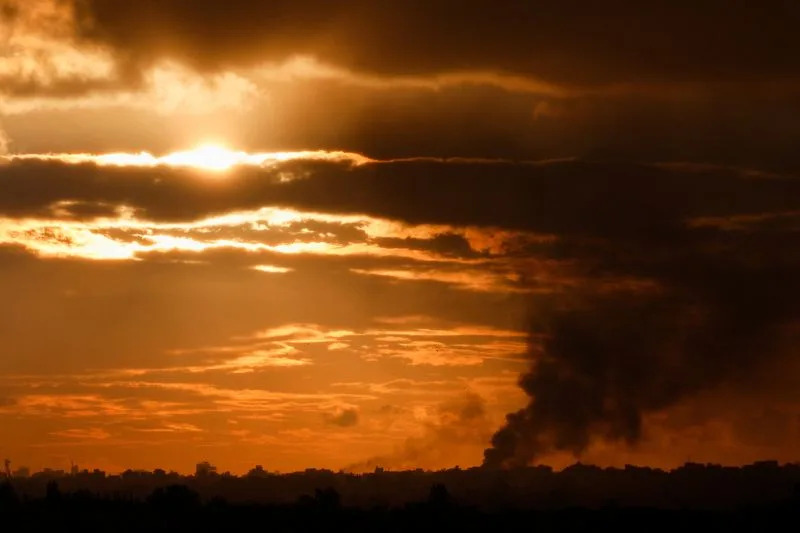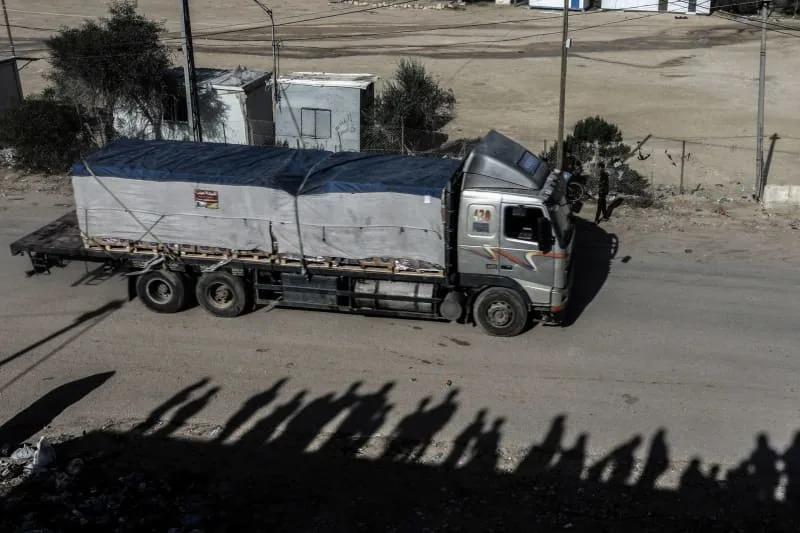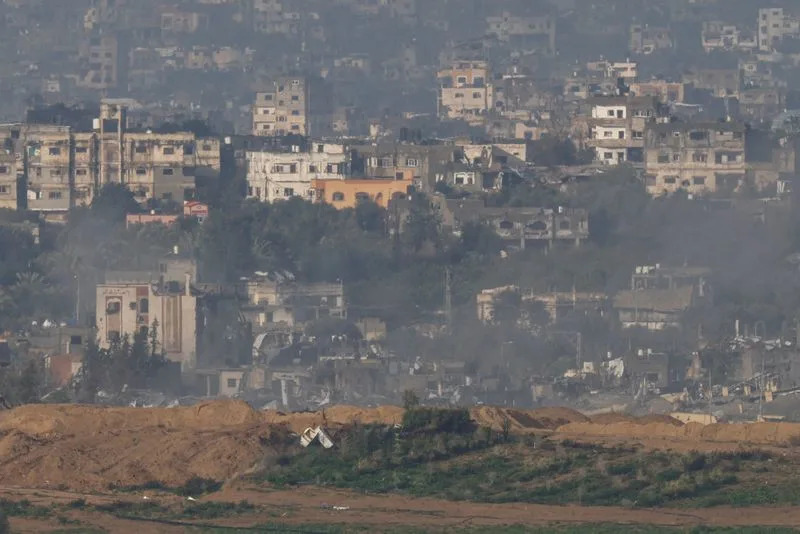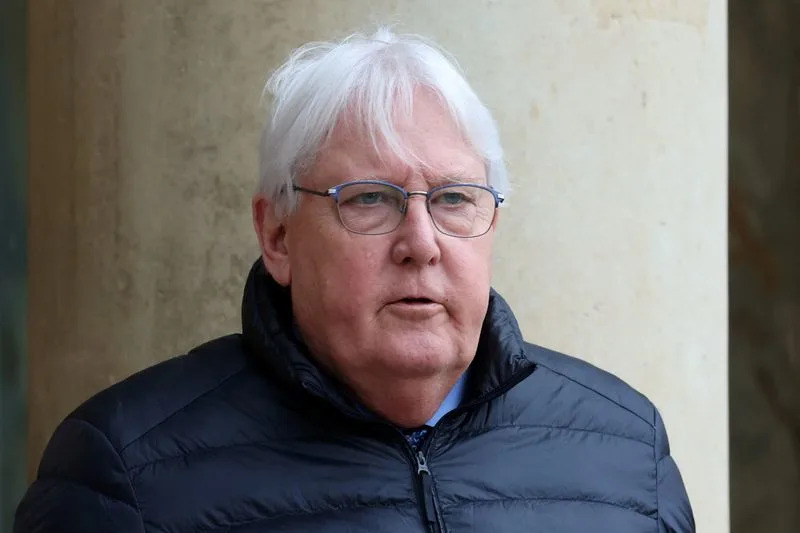The United Nations humanitarian office said on Friday that Israeli authorities were systematically denying it access to northern Gaza to deliver aid and this had significantly hindered the humanitarian operation there.
Smoke rises in north Gaza, as seen from Israel
"The operations in the north have become increasingly more complicated," said Andrea De Domenico, head of office for the U.N. Office for the Coordination of Humanitarian Affairs (OCHA) in the Occupied Palestinian Territories.
"We have systematic refusal from the Israeli side of our effort to get there, to access the north."
Israeli authorities and COGAT - an Israeli Defence Ministry agency tasked with coordinating aid deliveries into Palestinian territories - did not immediately respond to requests for comment.
Israel has previously denied blocking the entry of aid.
The Israeli offensive launched in the wake of a deadly rampage by Hamas militants in southern Israel on Oct. 7 has displaced most of Gaza's 2.3 million population, destroyed civilian infrastructure, and caused acute shortages of food, water and medicine.
Since the start of hostilities, aid deliveries to northern Gaza have been limited, and the area was cut off altogether from external aid for weeks earlier in the conflict.
De Domenico said Israel was concerned about fuel deliveries and other supplies that could be diverted to Hamas, and had been reluctant to authorise aid deliveries to hospitals in north Gaza.
"In particular, they have been very systematic in not allowing us to support hospitals, which is something that is reaching a level of inhumanity that, for me, is beyond comprehension," he said.
De Domenico said OCHA had not been authorised to return to Jabalia, and was allowed to bring only a very precise quantity of fuel to Al-Shifa Hospital that would last for a determined period.
In separate comments, the U.N. human rights office said that Israel, facing genocide accusations at the top U.N. court in The Hague this week, had repeatedly failed to uphold international humanitarian law.
"We've repeatedly highlighted Israel's recurring failures to uphold the fundamental principles of international humanitarian law: distinction, proportionality and precautions in carrying out attacks," said Elizabeth Throssell , spokesperson for the Office of the U.N. High Commissioner for Human Rights (OHCHR).
"The High Commissioner has stressed that breaches of these obligations risk exposure to liability for war crimes, and has also warned of the risks of other atrocity crimes."
Israel has denied allegations that it has committed war crimes.
UN warns not enough aid convoys are arriving in Gaza
Trucks carrying humanitarian aid, fuel and gas enter the Gaza Strip through the Rafah crossing with Egypt, hours after the start of a four-day truce in fighting between Israel and Palestinian Hamas militants.
Only five out of 24 scheduled humanitarian deliveries were carried out in the north of Gaza in the first 11 days of 2024, the UN's Office for the Coordination of Humanitarian Affairs (OCHA) in the embattled Gaza Strip said on Friday.
Israeli authorities rejected several scheduled deliveries to replenish medicine and supplies in Gaza City, the UN office said.
Other convoys, meant to deliver food, drinking water and other vital supplies as well as medicines, failed to pass. They were held up for too long at Israeli checkpoints or because agreed routes could not be utilized.
According to OCHA, the hospitals in the north therefore do not have enough material to care for the sick and injured.
The World Health Organization (WHO) estimates that 300,000 to 400,000 people are still living in the north of Gaza, after most of the population fled to the south following the onset of Israel's military campaign.
"Every day of assistance missed results in lost lives and suffering for hundreds of thousands of people who remain in northern Gaza," OCHA said.
The UN office also warned of potential unrest due to the lack of humanitarian aid arriving in Gaza.
The few UN convoys that arrived in the north of Gaza were stopped and cleared out directly behind the checkpoint, an OCHA representative said on Friday.
"It is a situation of desperation that you can feel," Andrea De Domenico, the local OCHA chief, said.
He emphasized that people were not aggressive, but are starving and urgently need more help. "This tension will increase if we do not scale up our operations," he added.
UN employees that had travelled to the north of Gaza this week reported seeing bodies lying on the road behind Israeli checkpoints.
The UN official spoke of a "level of inhumanity beyond comprehension."
Too many convoys are being blocked by the Israeli authorities, especially fuel deliveries to hospitals, De Domenico said. Israel fears that fuel deliveries could end up in the hands of Hamas and be used for attacks on Israel.
Israel has hit Gaza with massive airstrikes and launched a ground offensive into the Palestinian coastal area after terrorists from Hamas and other extremist groups carried out the worst massacres in Israel's history on October 7, killing some 1,200 people.
According to the Hamas-controlled health authorities in Gaza, 23,708 people have been killed in the sealed-off coastal strip since the beginning of the Israeli campaign. Some 60,000 are said to have been injured.
It is not possible to independently verify the figures.
According to the UN Children's Fund UNICEF, at least 70,000 children are now suffering from diarrhoea because of the devastating hygiene conditions in Gaza. Without treatment, this can be life-threatening for small children. Some 135,000 minors are at risk of acute malnutrition, said Lucia Elmi, UNICEF representative in the Palestinian Territories.
Meanwhile telecommunications services went down again on Friday, according to provider Paltel.
"We regret to announce that all telecom services in Gaza Strip have been lost due to the ongoing aggression," Paltel posted on X, formerly Twitter. "Gaza is blacked out again."
Since the beginning of the war between Israel and Hamas, communication networks in Gaza have failed several times.
Israeli air strike kills 11 in Gaza; UN says Israel blocks aid to north
A view shows damaged buildings in Gaza, amid the ongoing conflict between Israel and the Palestinian Islamist group Hamas, as seen from Israel.
Israel's latest attacks on Gaza have killed at least 151 people, including 11 in a single house, Palestinian health officials said on Friday, while the U.N. humanitarian office accused Israel of blocking its efforts to send aid to the north.
Residents reported continued aerial and ground fire across the territory from Israel, which has come under growing pressure to limit the number of civilian casualties from its war against the Hamas militants who attacked southern Israel on Oct. 7.
The Israeli government says it goes to great lengths to protect civilians, accusing Hamas of deliberately using them as human shields and diverting aid, allegations which the militants deny.
Gaza health officials said the 11 people had been killed by a single air strike around dawn in a house in Deir Al-Balah belonging to the Fayad family, a prominent name in the city.
Israel said it could not comment without more specifics. It said earlier that its forces had killed dozens of militants in nearby Maghazi and in the southern city of Khan Younis. The armed wings of Hamas and fellow Islamists Islamic Jihad each said their fighters had hit Israeli tanks and bulldozers with anti-tank rockets in several areas where Israel was operating.
Palestinian medics said another Palestinian had been killed and several others wounded in an Israeli strike that targeted a group of people on a main road between the central and the southern areas of Gaza.
Residents and the telecommunications company said Friday's fighting cut communications across Gaza.
Since the New Year, Israel has announced a new phase in the war, saying it will begin withdrawing its forces from the northern half of the Gaza Strip where they deployed three weeks after the militants rampaged through southern Israel.
Sporadic fighting has continued in the north and intensified in southern areas, where Israel extended its ground campaign to wipe out the militants last month and where the vast majority of Gazans have sought shelter on Israeli advice.
'BEYOND COMPREHENSION'
The U.N. humanitarian office said Israeli authorities were blocking its efforts to help people who had stayed in the north for fear the militants would seize supplies.
"We have systematic refusal from the Israeli side of our effort to get there," said Andrea De Domenico, Head of Office for the United Nations Office for the Coordination of Humanitarian Affairs in the Occupied Palestinian Territories.
"In particular, they have been very systematic to not allowing us to support hospitals, which is something that is reaching a level of inhumanity that, for me, is beyond comprehension," he said.
Israel says it does not block aid and blames holdups on what it says are poor logistics by the U.N. and other aid agencies. Aid officials say Gazans are on the verge of starvation and suffering from diseases brought on by a lack of fresh water and sanitation due to widespread bombing.
As Israeli tanks redeploy in some areas, residents reveal the aftermath. In Al-Bureij - focus of Israeli ground operations in the central Gaza Strip - images posted by a local journalist showed the destruction of the main stadium.
Health officials said earlier that an overnight Israeli air strike in the Sabra suburb of Gaza City in the north had killed three people and wounded dozens. Civil emergency said intense Israeli fire had hampered efforts to reach them.
Gaza health officials said on Friday Israel's offensive had killed 23,708 people and wounded more than 60,000, mostly civilians.
"Many victims are still under the rubble and on the roads. Rescue teams and civil emergency crews are unable to reach them," Gaza health ministry spokesman, Ashraf Al-Qidra said, adding that the 151 reported dead were those brought to hospital.
Israel says it has no choice but to end Hamas rule in Gaza after the militants, who are sworn to Israel's destruction, killed 1,200 people, mainly civilians, and took 240 hostages back to the territory.
More than 100 hostages remain in Gaza and Israel said on Friday it had made an arrangement with Qatar that will allow the delivery of medications to those hostages who need them.
At the International Court of Justice, a second day of hearings was held into a case brought by South Africa in which it accuses Israel of committing genocide in Gaza, which Israel has rejected as 'baseless'.
Hamas said that given Israel's insistence that it was not starving the Palestinians of aid, it should flow freely in.
At Gaza's European hospital in Khan Younis, members of the Shaat family and others gathered to mourn the death of their loved ones who were killed in an Israeli strike further south in the narrow coastal strip.
"The day before yesterday we were targeted by a rocket, so we were displaced near the sea. They went back (home) to take the rest of the stuff that we needed for the house," said Samir Shaat, a relative of some of the victims.
"A first rocket targeted my brother and son. My nephews came to help them, but a second rocket hit them," he said.
UN aid chief calls anew for Gaza ceasefire, urges UN action to end war
France hosts international humanitarian conference for people of Gaza.
The U.N. aid chief on Friday said he was "deeply alarmed" by Israeli ministers' statements about "plans to encourage the mass transfer" of Palestinian civilians from the Gaza Strip to third countries and he called anew for a ceasefire.
"Unless we act, it will become an indelible mark on our humanity," Martin Griffiths, the U.N. undersecretary for humanitarian affairs, told the U.N. Security Council. "I reiterate my call for this council to take urgent action to bring this war to an end."
Griffiths painted a dire picture of a worsening humanitarian catastrophe in the Gaza Strip as Israel presses the offensive it launched after the Oct. 7 onslaught into Israel by the enclave's ruling Hamas Islamists that claimed some 1,200 lives.
Quoting Gaza's Hamas-run health ministry, he said that more than 23,000 Palestinians have been killed and more than 58,000 injured since Israel launched the offensive in which it vows to destroy Hamas.
The "horrific" situation created by the "relentless" Israeli operation can be seen in the displacement of 85% of Gaza's 2.3 million Palestinians "forced to flee again and again as the bombs and missiles rain down," Griffiths continued.
“There is no safe place in Gaza,” he said.
"We are deeply alarmed by recent statements by Israeli ministers regarding plans to encourage the mass transfer of civilians from Gaza to third countries, currently referred to as 'voluntary relocation,'" he said.
Such statements, Griffiths said, raise concerns "about the possible forced transfer or deportation of the Palestinian population from the Gaza Strip" in violation of international law.
The statements by far right-wing Israeli cabinet ministers also have prompted the United States, Israel's closest ally, to raise similar concerns.
U.S. Ambassador Linda Thomas-Greenfield and her British counterpart, Barbara Woodward, repeated those concerns during the meeting.
"These statements, along with statements by Israeli officials calling for the mistreatment of Palestinian detainees or the destruction of Gaza, are irresponsible, inflammatory, and only make it harder to secure a lasting peace," Thomas-Greenfield said.
Israeli officials, including Prime Minister Benjamin Netanyahu deny they have plans to forcibly move the Palestinian population from Gaza.
Ilze Brands Kehris, U.N. assistant secretary-general for human rights, said the high civilian casualty toll, massive destruction of civilian infrastructure and displacement of civilians "raise very serious concerns about the potential commission of war crimes."
She warned that the risk of further grave violations, even atrocity crimes, is real. Israel denies committing war crimes.
Israeli Ambassador Gilad Erdan, in scathing remarks, criticized the council for not condemning Hamas for its “heinous massacre” on Oct. 7, and said the United Nations had been “weaponized” against Israel.
The council has ignored Pakistan’s plan to deport up to 1.3 million Afghans while the United Nations has given the “red carpet treatment” to Syria, “a country that has murdered hundreds of thousands of its own citizen with barrel bombs," Erdan said.
“No Jews, no news,” he said.
The council met only hours after Israel rejected as false and "grossly distorted" accusations brought by South Africa in the U.N. International Criminal Court that its offensive is a state-led genocide campaign against Palestinians.
Meet the Israeli charity supporting Palestinians amid the Gaza war
In 1993, Yuval Roth's brother was killed by Hamas. But rather than write off Palestinians as dangerous, he instead joined The Parents Circle-Families Forum, a group bringing together Israelis and Palestinians who have lost family in the Israeli-Palestinian conflict.
When 2006 rolled around, a Palestinian member of that forum came to Roth, asking for his help transporting an ill family member to Rambam Hospital in the Israeli city of Haifa.
For years, Palestinian citizens have only been admitted to Israel in exceptional humanitarian cases. And a number of Israelis wanted to make travel out of the Palestinian territories less difficult for those affected by extreme personal circumstances.
One Roth agreed to drive that Palestinian to the appointment and began recruiting some of his friends to help as well. Soon, he received a donation from singer-songwriter Leonard Cohen.
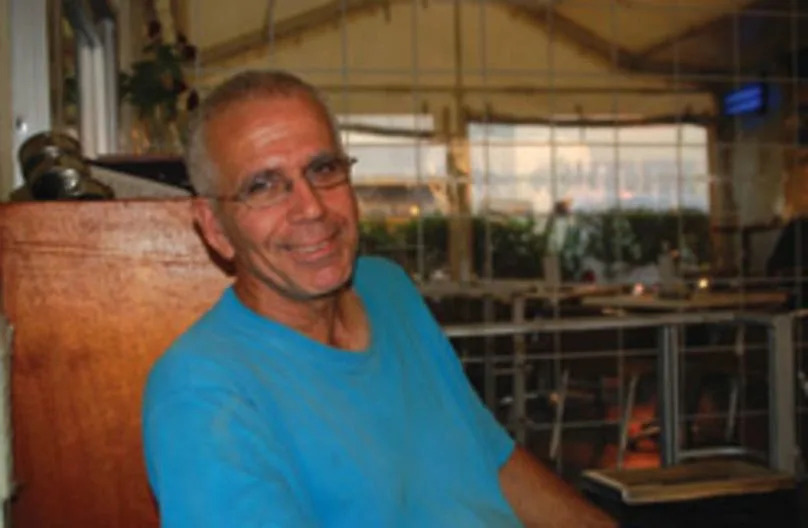
Bolstered by the support, Roth decided to turn his collective of volunteers into a non-profit organisation, and Road to Recovery was officially founded in 2010.
By 2018, the group had nearly 2,000 volunteers. In total, they made more than 20,000 patient trips for those needing everything from dialysis to organ transplants in that year alone. Roth says he sees its work as an act of reconciliation in his brother's honour.
But since Hamas’s attack on Israel on 7 October, in which some 1,200 people were killed, everything has changed.
Four Road to Recovery volunteers were killed in the attack; two others, 83-year-old Oded Lifschitz and 79-year-old Chaim Peri, are still being held hostage in Gaza.
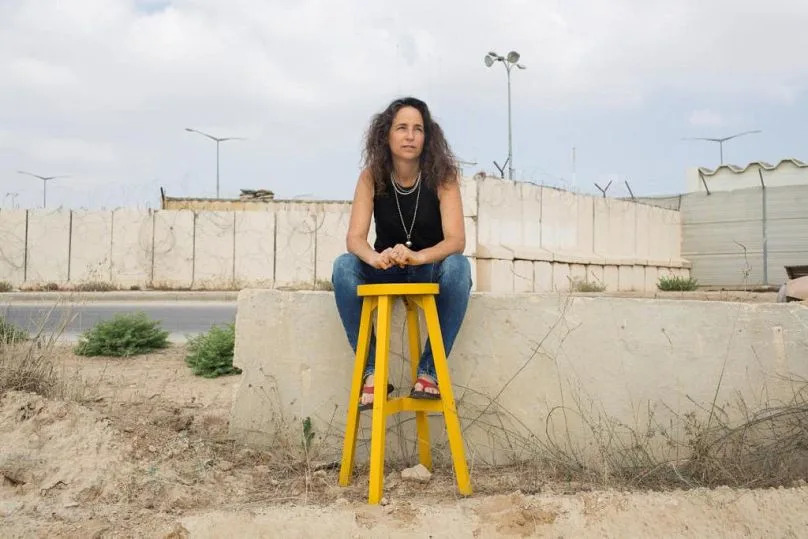
And the Israeli bombardment and invasion of the Gaza strip, an onslaught that has claimed more than 20,000 lives, means that Road to Recovery can no longer assist people who live there.
Yael Noy, the charity's CEO, says despite the limitations, Road to Recovery is still able to continue in the West Bank, but there are fewer checkpoints open now.
Volunteers are currently driving around 140 people every day to Israeli hospitals.
While the numbers have dropped off – workers in Noy’s coordinator centre numbered 17 before the war and are now just, she says, “8 or 9” – many Israelis are still keen to help those across the border.
“Everything changed in Israel on 7 October,” Noy tells Euronews.
“But, from 8 October, our organisation kept on doing what we're doing,” she adds.
Noy explains that now the conflict is more established, she is receiving daily calls from Israelis who want to help with the charity’s efforts.
Despite the pain and suffering, these people see Palestinians in need as human beings, and understand they are not all affiliated with Hamas.
But that's not the way everyone thinks.
“Many Israelis think all of the people in Gaza are Hamas, from a little child to an old woman," says Noy. "They say it's war time – we are enemies, we cannot help the enemy now. But on both sides, there are good people and bad people.”
While Noy says she and her volunteers rarely feel as though they are in danger, she tells Euronews she fears the day may well come when they face aggression from people opposed to their work.
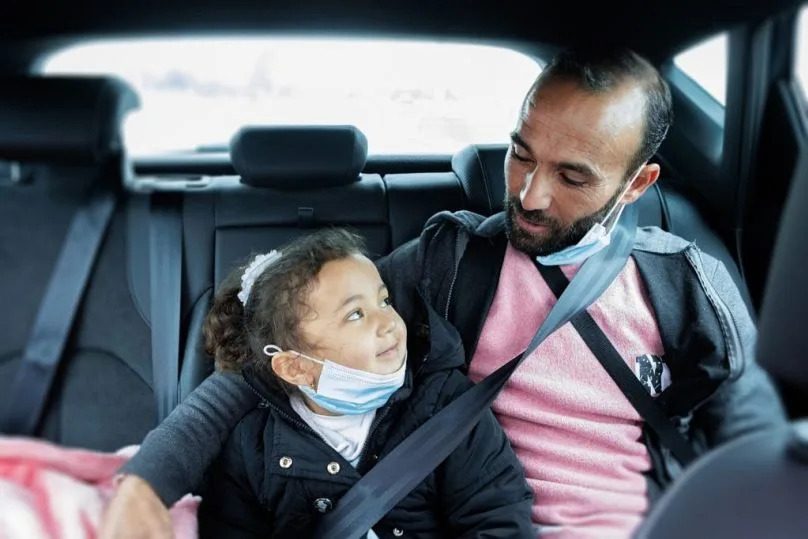
“We're not there yet," she says, "but maybe.
"After I spoke to the press earlier in the war, I got some phone calls from blocked numbers. They said very bad words to me and told me what violent things they wanted to do to me. Some people would just stay at home after such an incident as it would be easier - but I can’t.”
Noy now lives in northern Israel, close to Lebanon, but grew up in a kibbutz.
Her parents were living in Kibbutz Alumim, one of the communities which was attacked by Hamas, and are now displaced.
To make the conflict even more personal, two of Noy’s nephews have been fighting in Gaza as part of Israel's response to the October attacks.
For many in Israel, the plight of those in Gaza is fairly alien.
Local media, Noy tells Euronews, rarely covers the thousands of deaths and the lack of food, electricity and water available to millions of Palestinians.
"They need to open their eyes and listen. The majority don't know anything about it. Even those that do don’t want to talk about it here."
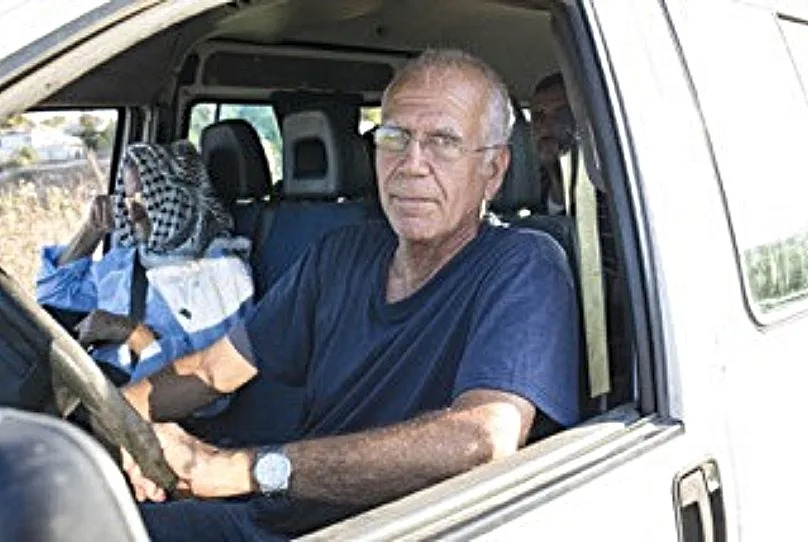
Road to Recovery receives no government funding, and the volume of donations from Israelis has dropped off since the conflict began. Yet Noy is somehow managing to keep the faith, even as her charity remains angry at Prime Minister Benjamin Netanyahu and his cabinet.
“I'm not a politician. I don't know what the government can do. But I know what my organisation needs. We're holding a little candle of light in this terrible area and we just need the support of the world,” she says.
“We need support from across the globe, you know, because, in Israel, no one will support us now.”



